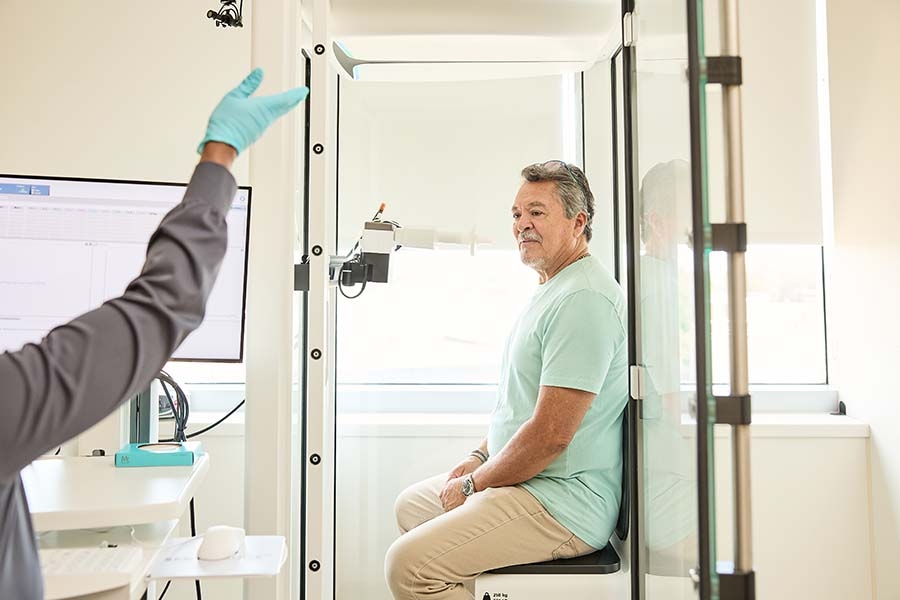Affecting more than 16 million Americans, chronic obstructive pulmonary disease (COPD) is one of the most common and serious lung diseases.
COPD is a progressive lung condition, meaning it gets worse over time. Most people who develop COPD have a long history of exposure to cigarette smoke, pollutants, or certain kinds of chemical fumes. However, some individuals develop COPD due to a rare genetic condition known as alpha-1 antitrypsin (AAT) deficiency. This condition significantly increases the risk of developing COPD, with approximately 80% of individuals who have AAT deficiency also developing COPD.
Dr. Matthew Gordon, who specializes in treating AAT deficiency and manages the AAT Deficiency Program at the Temple Lung Center, will answer questions about this rare condition.
Q: What is AAT deficiency?
AAT is a protein that is made in the liver. This protein helps protect the body from tissue damage that can be caused by an enzyme that is part of our immune system. While this enzyme helps fight infections, it can also attack healthy tissue in the body if it is not held in check by the AAT protein. For my patients with AAT deficiency, their liver doesn’t produce enough functional AAT. This leaves their bodies less protected from this enzyme, and that can damage the healthy tissues in their organs, including their lungs.
Because AAT deficiency is rare, many of my patients are surprised to learn they have developed COPD, and they don’t know much about this lung disease.
Q: Who is at risk for AAT deficiency?
AAT deficiency is an inherited disease, so the disease runs in families. Anyone with the disease inherits two mutated, or changed, AAT genes — one from each parent.
If someone inherits one muted AAT gene from one of their parents and a normal AAT gene from their other parent, then that person will be a carrier of the disease. They don’t have the condition, but they can pass the mutated gene onto their children.
Q: What are the symptoms of AAT deficiency?
Patients with AAT deficiency who develop COPD in its early stages may not experience any symptoms or only mild ones. But as the disease gets worse, symptoms become more common. Most of my patients with COPD may experience some or all of the following symptoms:
- Shortness of breath
- Wheezing or a whistling sound when breathing
- Tightness in the chest
- A chronic cough that sometimes produces a thick mucus
In addition to wheezing and shortness of breath, my patients with AAT deficiency who develop COPD may also experience:
- Fatigue
- Unexpected weight loss
- Frequent respiratory infections
- A fast heartbeat after standing up
Since AAT deficiency is rare, many patients are not diagnosed with it until they begin having symptoms of COPD.
Q: Who should get tested?
I recommend that anyone who has been diagnosed with COPD or who has a family history of AAT deficiency be tested for the condition, which is diagnosed with a blood test or cheek swab.
Q: What are the treatment options for COPD and AAT deficiency?
While there is no cure for AAT deficiency, I can offer my patients a wide range of innovative treatments for COPD, including a treatment that targets AAT deficiency directly. Some of the most common treatments I prescribe for people with both COPD and AAT deficiency include:
- Augmentation therapy. This treatment involves weekly intravenous infusions of AAT protein. My patients who undergo this treatment tend to show improvement in their COPD symptoms and are able to maintain their lung health for a longer period of time.
- Bronchodilators. These medications relax the muscles around the airways to make breathing easier.
- Inhaled corticosteroids. These can reduce inflammation in the lungs, improving breathing.
- Antibiotics. If prescribed early, antibiotics can help alleviate particularly bad bouts of COPD.
- Flu and pneumococcal vaccines. People with COPD are at high risk of getting seriously ill from these viruses that affect the lungs.
- Surgery. In advanced cases of COPD, some of my patients undergo lung surgery to help improve their quality of life.
Every patient is unique. So when I craft a treatment plan, I work closely with our respiratory therapists, nurses, and other clinicians. In most cases, if I see a patient with both COPD and AAT deficiency, I recommend that they undergo some of the treatments mentioned above and enroll in any relevant clinical trial too. Temple Lung Center has ongoing AAT deficiency clinical trials for people who qualify.
Q: Why is it important to be treated at a center that specializes in AAT deficiency?
For patients with rare disorders like AAT deficiency, it’s important to seek care at a facility like Temple Lung Center which leads the way in diagnosing and treating complex lung problems. The Temple Lung Center is an international leader in the development of COPD care, having pioneered many of the most effective new treatments for the condition. The right care can help patients live longer, more comfortable lives.
If you think you have COPD, or you have a family history of AAT deficiency, schedule an appointment today with one of Temple’s expert pulmonologists.
Helpful Resources
Looking for more information?

